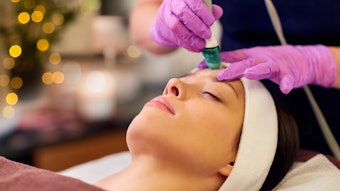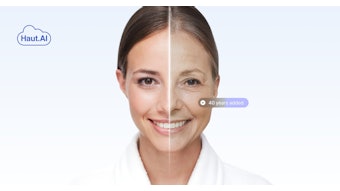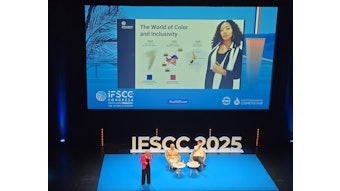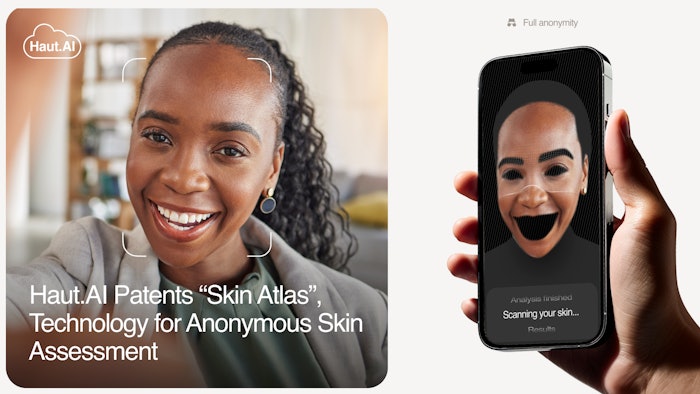
In an era of daily digital privacy crises, Haut.AI has focused on delivering anonymous skin analyses via its newly patented Skin Atlas system. By adding this functionality, the company aims to uphold high data privacy standards and consumer trust anywhere the system is used. It also renders skin analysis for personalized experiences more accessible, reliable and safe for a wider array of brands.
How Haut.AI's Skin Atlas Works
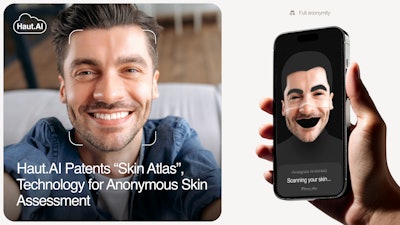 When high quality images of consumers are submitted to the cloud for analysis, Haut.AI's anonymization technology reportedly "strips ... facial images of all personal identifiers and non-skin-related data, leaving only the essential skin pixels for analysis."
When high quality images of consumers are submitted to the cloud for analysis, Haut.AI's anonymization technology reportedly "strips ... facial images of all personal identifiers and non-skin-related data, leaving only the essential skin pixels for analysis."
The privacy features notably have no impact on the accuracy of analyses in e-commerce and clinical settings, per Haut.AI.
When high quality images of consumers are submitted to the cloud for analysis, Haut.AI's anonymization technology reportedly "strips ... facial images of all personal identifiers and non-skin-related data, leaving only the essential skin pixels for analysis."
All images are standardized by detecting facial key points, per the company. The system's algorithms segment and reconstruct the face's skin regions, transforming them into a "Skin Atlas" format that supports "rapid and secure processing," according to the company.
The final outcome is a set of personalized skin care recommendations.
These capabilities are featured in U.S. Patent Application No. 20220335252A1, titled "Method and system for anonymizing facial image data," by Anastasia Georgievskaya, Timur Tlyachev, Arseniy Golodyayev, Roman Kiryanov and Konstantin Kiselev.
Boosting Security & Accuracy While Removing Bias
“‘Skin Atlas’ enables users to confidently share their images for analysis, knowing their personal information is protected," says Anastasia Georgievskaya, CEO of Haut.AI. "The anonymization process ensures that all identifying features, such as eyes, mouth, hair and background details, are removed, focusing solely on the skin. This safeguards privacy and also enhances the accuracy of our skin assessments by eliminating potential biases from non-skin-related information. We are excited about the potential of this technology to provide more secure and accurate skin diagnostics, ultimately benefiting both users and professionals in the skin care industry."
Democratizing Data Security Compliance
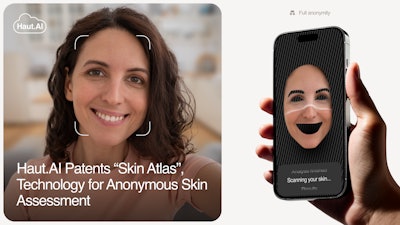 “‘Skin Atlas’ enables users to confidently share their images for analysis, knowing their personal information is protected," says Anastasia Georgievskaya, CEO of Haut.AI.Haut.AI
“‘Skin Atlas’ enables users to confidently share their images for analysis, knowing their personal information is protected," says Anastasia Georgievskaya, CEO of Haut.AI.Haut.AI
She explains, "Consumers are becoming more cautious about their privacy, and they will only trust a brand’s personalized services if they know their data is being handled securely. However, for many brands—especially smaller or mid-sized ones—building the necessary data secure systems can often be beyond their technical capabilities."
There are other regulatory considerations as well.
"[T]he regulatory compliance adds another layer of complexity," says Georgievskaya. "Many privacy laws today demand strict standards for data handling, user consent, and transparency. For many brands, especially those new to the world of personalized solutions, keeping up with these regulations can be daunting and expensive. The cost of failing to comply—both financially in terms of fines and reputationally—can be overwhelming."
She adds, "Yet, personalization is a growing trend, and all brands, from small to industry giants, want to tap into this experience that consumers increasingly demand. This is why brands are turning to technology providers like Haut.AI. By purchasing ready-to-use, privacy-focused technology solutions, brands can rely on the fact that most privacy concerns and regulatory compliance challenges have already been addressed."
